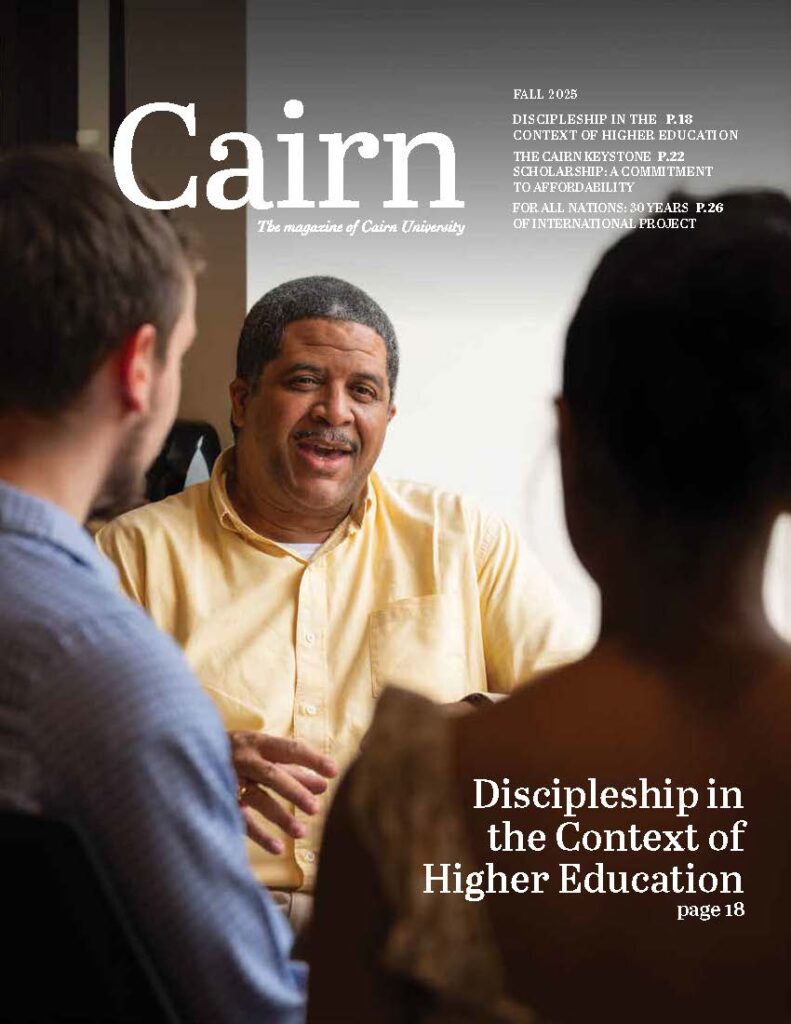“You shall walk after the Lord your God and fear him and keep his commandments and obey his voice, and you shall serve him and hold fast to him.”
This is Deuteronomy 13:4, and outside of the specific orders given to Adam in Genesis, it may stand as the next closest thing to Adam’s “Bible.” He could write his garden commands on his left hand and this exhortation on his right. The context of Deuteronomy 13:4 reinforces this Edenic connection. Along with parallel verbs, Deuteronomy 13:4 is couched among content dealing with the protection and service of a gifted land (13:12–18), the expulsion of sinners from sacred space (13:5,11), the divinely superintended testing of the heart (13:3), and the hearing of God’s voice over that of the “enticer” (13:6). The point is that this word from God is not just ancient to us; the essence of the command is primeval even to Israel. Yet, Deuteronomy 13:4 is also a highly relevant injunction for the people of God living today in anticipation of his coming, since the New Testament warns about false prophets who work wonders while seducing with false teaching—perhaps even a final test of wonder-working deception for the last generation of the church (see 2 Thess. 2:8–10). Eschatology aside, we are often daily drawn to go after other gods, so we would do well to hear again the familiar, ancient, and urgent commands of Deuteronomy 13:4, verb by verb.
No verse in the Old Testament has a longer string of covenantal verbs than Deuteronomy 13:4. The verbs should be understood individually so that they can be taken collectively. The first verb in verse 4, halakh, is a staple of travel narratives and covenantal exhortation, often translated as “go,” “move,” or “walk.”1 Well over half of the usages of halakh in Deuteronomy refer to concrete movement; the remaining instances take on the figurative dimension of covenantal walking. The distinction between the literal and the figurative is profoundly blurred when God is the subject of the verb. God’s concrete walking/going in Deuteronomy is covenant walking, a fact highlighted at the beginning of the book: “The Lord your God who walks (halakh) before you” (Deut. 1:30). YHWH’s sacred halakh is also characterized as an Edenic walking of presence: “The Lord your God walks in the midst of your camp” (Deut. 23:14). Thus, the command for Israel to walk after God is not a frustrating pursuit of communion with the divine but is reciprocal, available, and mutually active. This reciprocity makes walking after God inherently exclusive, grounded in the acknowledgment: He is here with us, walking with us now, and I can act on his presence and word.
The next verb is “fear” (yare). In Deuteronomy, yare is mostly used of the terror and anxiety of YHWH’s enemies. Is Israel to tap into that fear? Yes—but with covenantal transformation. Covenantal fear is not a diluted fear. As he does in Deuteronomy 13, YHWH repeatedly calls Israel to remember what he did to Egypt, a mass spectacle of death and salvation. In line with the graphic impact of remembering YHWH’s works, yare is characterized through Deuteronomy as an acutely life-changing assimilation of YHWH’s revelation of himself, wonder and dread alike. This covenantal fear is not a cheaply conjured emotion. If fear can be commanded, then it is a decision of the spiritual life. Psalm 64 links pondering the Lord with fearing him. The outcome for the psalmist is not paralysis but action and loyalty. In Deuteronomy, fear is transforming: It prevents forgetfulness and idolatry (4:10; 6:13), sustains lifelong obedience (6:2), and is paired with love (10:12). Fear while in relationship with God is constructive, since, according to Deuteronomy, one can test whether one is fearing YHWH appropriately if their life changes in the ways Deuteronomy describes. For us, like Israel, a healthy godly recoil at God’s infinite qualitative difference (like that of Peter in the boat with Christ after the catch of fish) is often produced from reassessment of what you think you have fully internalized of him.
Israel is further told to “keep” (shamar) the commandments and “obey” (shama) his voice. Shamar conveys the idea of protection, watchful attentiveness, guarding, and observance. Shama conveys responsive listening—so responsive that it is idiomatic for obedience itself. Adam was called to do both of these verbs and failed in both. Keep and hear are often paired together in Scripture, and multiple times they are connected to a loving relationship. Jesus’ conditional statement in John 14:15 highlights what is intuitive to all of us: We cannot do whatever we want in any sphere of a relationship and then wonder why that relationship is not flourishing. In our eternal state, we will have full conformity of our desires with God’s way. The psalmist of Psalm 119, who loved meditating on God’s will, wanted to begin that early, and Jesus invites us to do the same in our conforming to his law.
Israel is then instructed to “serve” (avodah) YHWH, a verb connoting worship and cultic devotion. This was Israel’s great covenantal privilege among the nations. Samuel tells Saul that “to keep (shamar) is better than the fat of rams” and “to obey (shama) is better than sacrifice” (1 Sam. 15:22) Samuel is charging Saul with sinfully confusing the benefits of being in covenant with YHWH with the core expectations of the relationship. He has put the privilege of service before the necessity of obedience. David makes a similar point in his confession in Psalm 51. Adam, the priests of Israel, and the whole nation of Israel are called to avodah. It is their privilege because it is stewardship of the meaning of life: nearness to the presence of God. Perhaps in one of the greatest twists of covenantal verbs in salvation history, God comes to serve among us to be near us without end, expressed in Christ’s simple declaration of love: “the Son of Man came not to be served but to serve”(Matt. 20:28). God has modeled what he has commanded, as he always has.
Walking with someone, deference, keeping the expectations of a relationship, responsively listening, and serving another person are not unusual in the course of our many relationships, but the last verb in Deuteronomy 13:4 is unique. Davaq is often translated as “cling,” “cleave,” “hold fast,” or “remain attached,” and it is a heightened relational act. God chooses a word connoting deep attachment to climax the call to absolute covenant allegiance. The term is famously used of spouses in Genesis 2:24 and an expression of unfailing love in the reinvigorated fictive kinship bond between a Moabite and a Bethlehemite (see Ruth 1:8). Given Deuteronomy 13:3’s emphasis on testing Israel’s love of YHWH, there is no reason to strip davaq of those intense relational connotations. This is the intimacy the psalmist has with YHWH, saying, “My soul clings to you” (Ps. 63:8). Clinging in the Psalms can be desperate or joyful, so it is no surprise that multiple individuals cling to Jesus in the Gospels. Although not identical, we also find God clinging to us, in accord with many verses throughout Scripture that speak of his mutual hold on his people—a grip stronger than our own (see John 10:28–29; Rom. 8:38–39; 2 Tim. 2:13).
The context of Deuteronomy 13:4 is a test of love. God allows a prophet or dreamer to have a sign or wonder come to pass, but this worker of signs seduces Israel to worship something other than the Lord.2 YHWH does not allow this test to get information. Rather, the test provides a heightened opportunity to actively and consciously decide to “do” the verbs of Deuteronomy 13:4, which changes a person and deepens their relationship with their covenant Lord and creator. The resoluteness and pace by which one purges the enticement to go after something other than God is directly proportional to one’s love for God. So, when we do the verbs of Deuteronomy 13:4, we are carving ourselves and our community out of marble—an identity more immovable and enduring than what we were.
- The tone of undivided covenant-keeping marks every part of this verse. The phrase “walk after the Lord your God” is conceptually familiar at this point in the Pentateuch, but its syntax is unique. In the Pentateuch’s legal literature, every place “walk after” appears, the object is always other gods—only here is YHWH the object. The emphasis on exclusivity is strengthened by the word order in Hebrew, in which YHWH consistently and emphatically fronts every verb. He is the grammatical and theological anchor of the verse. ↩︎
- There are indications in the Passion narratives that Jews believed they were fulfilling the command of Deuteronomy 13:1–5 to remove a sign-wielding blasphemous prophet. This frames the killing of Jesus as the greatest act of covenantal dullness and betrayal, ironically executing the embodiment of Deuteronomy 13:4 while thinking they are being obedient to it and its context. ↩︎










